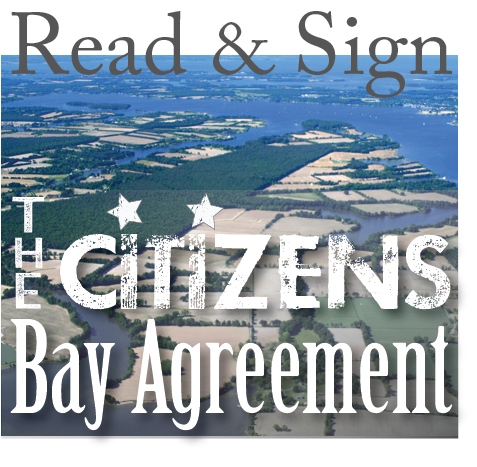Chesapeake Bay Action Plan
After decades of effort, the voluntary, collaborative approach to restoring the health and vitality of the Chesapeake Bay— the largest estuary in the United States—has not worked and, in fact, is failing.
A diverse group of 57 senior scientists and policymakers have joined forces to save the Bay. This is our plan.
Regulating Agriculture: Taking the Profit Out of Pollution
(Posted by Howard Ernst.)
Agricultural practices in the Bay region today remain grossly under-regulated, giving a tremendous economic advantage to those who pollute our waterways with environmentally irresponsible farming practices. Industrial agricultural production is the single biggest source of pollution to the Bay because the current rules (or lack of them) make this form of food production the most profitable. Sensible agricultural regulations level the playing field, take the profit out of pollution, and are absolutely essential to restore the Chesapeake Bay.
Who’s Watching the Watchers?
Posted by Fred Tutman.
Last week I had the edgy and unwelcome task of informing an elderly resident in Gambrills that our testing of her well water revealed huge amounts of Thallium, Barium and Aluminum. This was most likely caused by a nearby former coal waste disposal site. This gentle soul whom I suspect has lived in the same home and consumed the water there for her entire life, has lately been living with cases of bottled water sitting on her porch provided courtesy of some energy company.
But she still does not have justice.
Comparing Two Icons: Chesapeake Bay and the Great Barrier Reef
Posted by Bill Dennison.
The Integration and Application Network has been working with various groups in Queensland, Australia to produce an environmental report card for the Great Barrier Reef, modeled in some ways after the Chesapeake Bay report card. Comparisons between the two large ecosystems can be made and these comparisons can provide insight into both Chesapeake Bay and the Great Barrier Reef.
Septic Solution for a Cleaner Chesapeake Bay
Posted by Sen. Brian Frosh.
Some of the best minds—including the diverse group of scientists and policymakers who are signatories of the Chesapeake Bay Action Plan—have devoted decades of study to determine the causes of the Bay’s decline and remedies for its revival. (If you haven’t already, check out the no-nonsense 25-Step Action Plan tab at the top of this page.)
Part of the Plan is to rein in nitrogen that now seeps from septic systems into the Bay and our groundwater.
We’ll take a significant step toward limiting nitrogen if the General Assembly approves a proposal by Maryland Gov. Martin O’Malley to ban future installations of septic systems in most new housing developments throughout the state.
“Smart Growth” in Maryland–Not So Smart
(Posted by Gerald Winegrad) No matter how one scores it, the Chesapeake Bay is still in trouble. We’ve done the easy things. Now, if we want to restore the bay and save our natural heritage, we must do the most difficult tasks. Among these critical elements are the necessity to limit population growth and related…
Chesapeake Nutrient Trajectories: A New Data Analysis Reveals the Real Story
Posted by Bill Dennison.
Bob Hirsch and co-workers at the U.S. Geological Survey have developed a new method of analyzing long-term trends in nutrients that enter Chesapeake Bay from the rivers or tributaries that flow into the Bay. This method accounts for seasonal changes and year-to-year variation in flow, so that one can see the “forest for the trees.” The difficulty in analyzing flow and nutrients that enter Chesapeake Bay is the high degree of variability (or noise) in the data, making it difficult to discern trends, particularly long-term trends. Bob was able to use daily water flow data over a 31-year period, stretching from 1978 until 2008 from nine sites around Chesapeake Bay. Bob took these 100,000+ daily streamflow measurements and combined them with 13,000+ nutrient measurements to come up with daily nutrient loading estimates at each site. Then he was able to calculate a “flow-normalized daily flux,” which takes out the variations in flow due to weather. In this way, the long-term trends could be distinguished from the short-term variations.
Is Immigration Killing the Chesapeake Bay?
Posted by Tom Horton.
Stand back so you don’t get splattered. I’m going to talk about immigration, and I’m going to get right down in the sewer.
Are immigrants really responsible for degrading the Chesapeake Bay? It’s easier and safer, by far, of course, to say it is too much nitrogen, too much phosphorus, too much sediment, too much clearing and paving and filling—all the usual suspects.
All this, of course, is caused by people, and during the last decade, most of those people were immigrants, both legal and illegal, and their children.
Shifting Baselines
Posted by Bill Dennison.
Incremental changes that occur slowly over long periods of time are often difficult to detect.
We are senior Chesapeake Bay scientists and policymakers from Maryland, Virginia and Pennsylvania who have concluded that after decades of effort, the voluntary, collaborative approach to restoring the health and vitality of the largest estuary in the United States has not worked and, in fact, is failing. Our group unanimously recommends that all states draining into the Chesapeake Bay adopt our 25 action items in their Watershed Implementation Plans (WIP) and implement them to improve the Bay’s water quality and to meet the requirements of the Clean Water Act.
Sign up for news & updates from Patuxent Riverkeeper
